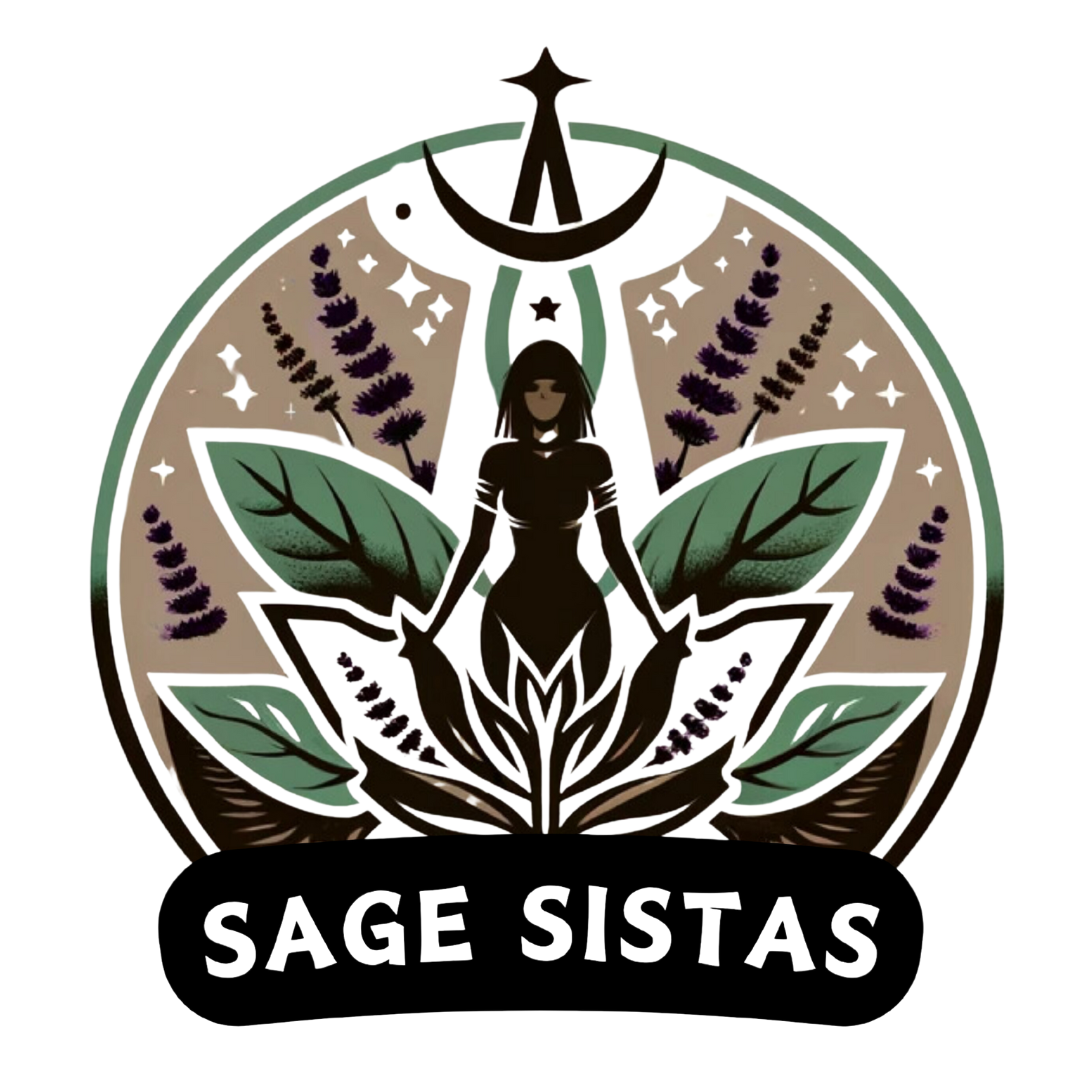Holistic Herbalism: What You Need To Know
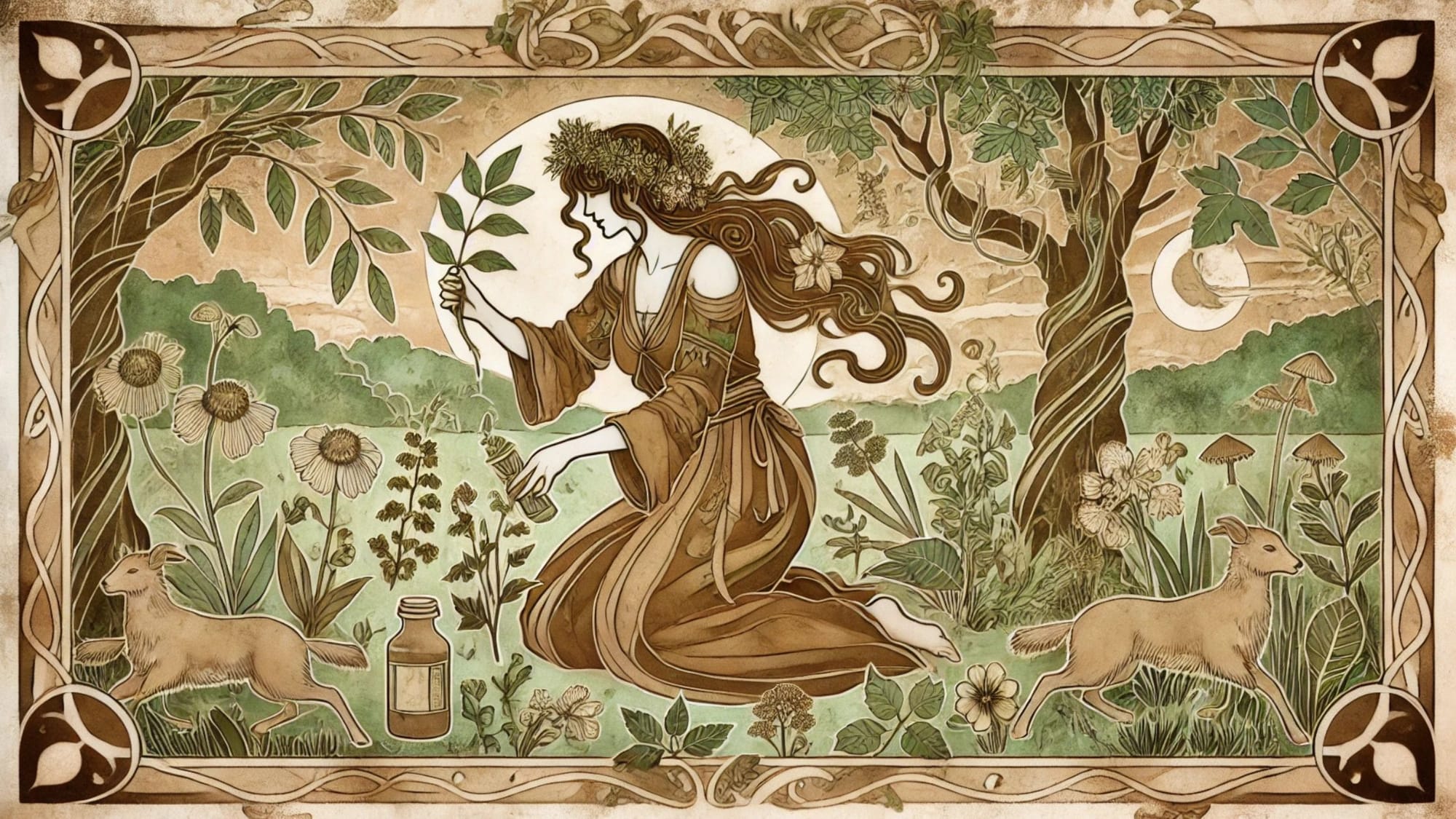
Holistic herbalism is a way of healing that uses natural herbs to treat the whole person—body, mind, and spirit.
Unlike regular medicine, which often tries to stop symptoms with drugs, holistic herbalism tries to find and fix the root causes of sickness by helping the whole body stay healthy and helping the person understand the symptom as a message of a deeper imbalance.
Some people think that using herbs instead of medicine is enough to be considered holistic, but there's much more to it. True holistic herbalism is about really understanding how plants can support a person’s body, feelings, and spirit.
In this blog post, we'll try to clarify what holistic herbalism really is. We’ll talk about how this ancient way of healing can be a part of our lives today, making us healthier and connecting us more with the natural world.
Table of Contents
1. What Is Holistic Herbalism?
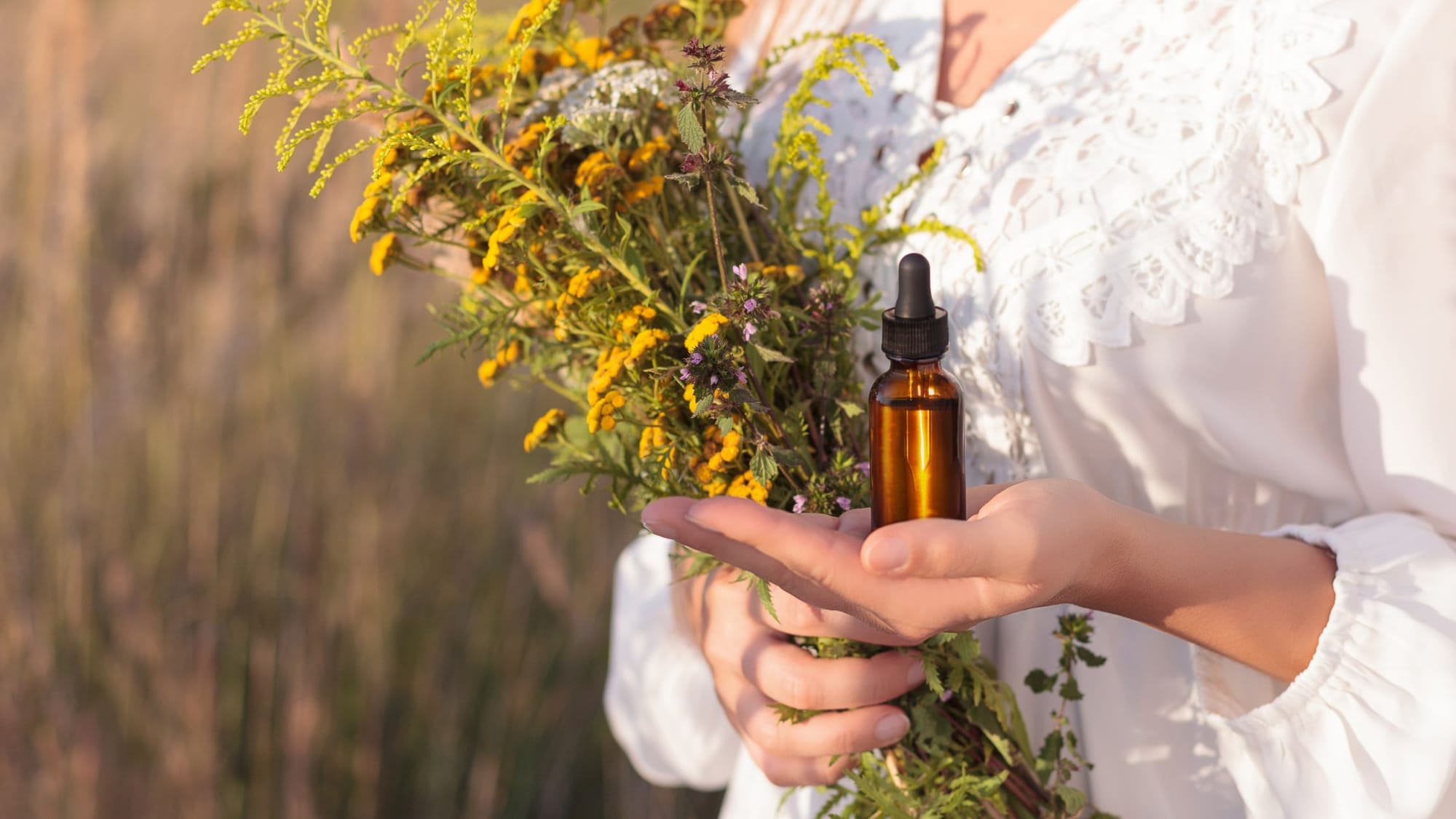
What does "holistic" mean when we talk about herbal medicine?
Holistic herbalism is all about looking at the whole picture of a person's health. It's not just about treating one symptom or part of the body. Instead, it focuses on everything—your body, your mind, and your spirit. This means using herbs to help improve all parts of you, not just one, and looking at the broader picture instead of getting lost in a small detail such as a specific symptom.
What Is NOT Holistic Herbalism?
Holistic herbalism is NOT using herbs instead of regular medicine!
True holistic herbalism is much more than just swapping out pills for plants. It's about really getting to know the person and the plants deeply and find the right match for that specific moment, understanding the root cause of the disease and helping the body self-heal instead of suppressing the symptoms, which are important messages not to overlook and simply silence.
Holistic herbalists think about how each herb can help a person's entire health, considering their emotions and spirit as well as their body. This approach helps to truly heal and support the whole person, boosting the inner healing vital force inside of us.
2. Matching People With Plants
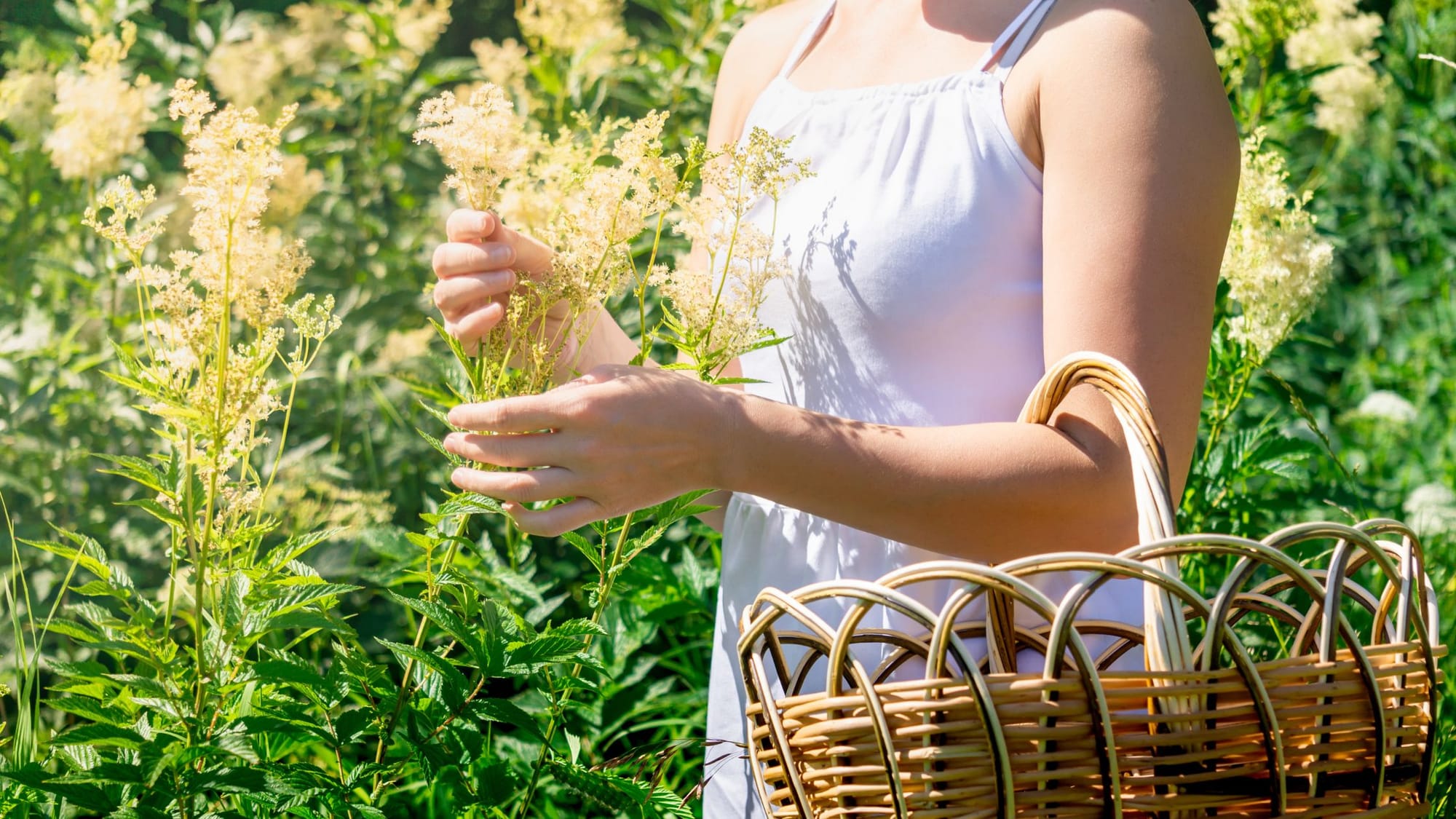
Holistic herbalism looks deeper than just the chemical effects of herbs on the body. It involves understanding how an herb interacts with every aspect of a person—physically, mentally, and spiritually. This means that each individual is unique, and their needs for healing go beyond the physical symptoms.
Choosing The Right Herbs
When choosing herbs, it is important to consider these factors for each person:
Constitution:
Every person has a unique physical makeup or constitution that responds differently to various herbs. What works well for one person might not work for another, even if they have similar symptoms.
Herbal Energetics: Plants as well have their own unique energetic blueprint based on the 4 elements and qualities (hot/cold, moist/dry) and it's important to match those qualities to the person's constitution and imbalances.
Psychological State:
Mental and emotional states play a crucial role in selecting the right herb. Some herbs can calm the mind, reduce anxiety, or help lift depression, aligning with the psychological needs of the person.
Spiritual Lessons:
Sometimes, the health challenges we face are linked to larger lessons in our lives. Holistic herbalism often considers what life lessons might be influencing a person's health and how specific herbs can support their spiritual growth and healing.
Real-Life Examples
To show the effectiveness of matching people with plants, consider the case of someone suffering from chronic stress and poor sleep. A holistic herbalist might recommend herbs like ashwagandha or valerian, not just for their sleep-inducing properties but because they suit the person’s overall temperament and lifestyle, leading to better long-term results.
Another example might involve a person experiencing digestive issues linked to anxiety. Rather than simply prescribing digestive aids, an herbalist might choose herbs that also address anxiety, recognizing the connection between the gut and the brain.
These examples show how holistic herbalism goes beyond treating symptoms to truly aligning with the person’s overall condition and path to wellness.
3. Holistic Approach In Herbalism
While holistic herbalism fundamentally involves the use of plants for healing, it's much more than just substituting herbs for pharmaceuticals. A true holistic approach includes:
Flower Essences: These are used to address emotional and mental aspects of wellness. By capturing the energetic imprint of flowers, these essences can help balance emotional disturbances, enhancing overall well-being.
Mineral and Vitamin Supplements: Recognizing nutritional deficiencies is crucial in holistic herbalism. Supplements are used to restore balance and support the body's healing processes, complementing herbal treatments.
Energetic Nutrition Tips: Holistic herbalism also considers the energetic qualities of foods and their impact on the body’s health. This approach helps tailor diets that support the individual's overall energy and health needs, aligning with the herbal therapies being used based on personal constitution and herbal energetics.
4. Essentials Of Holistic Herbalism
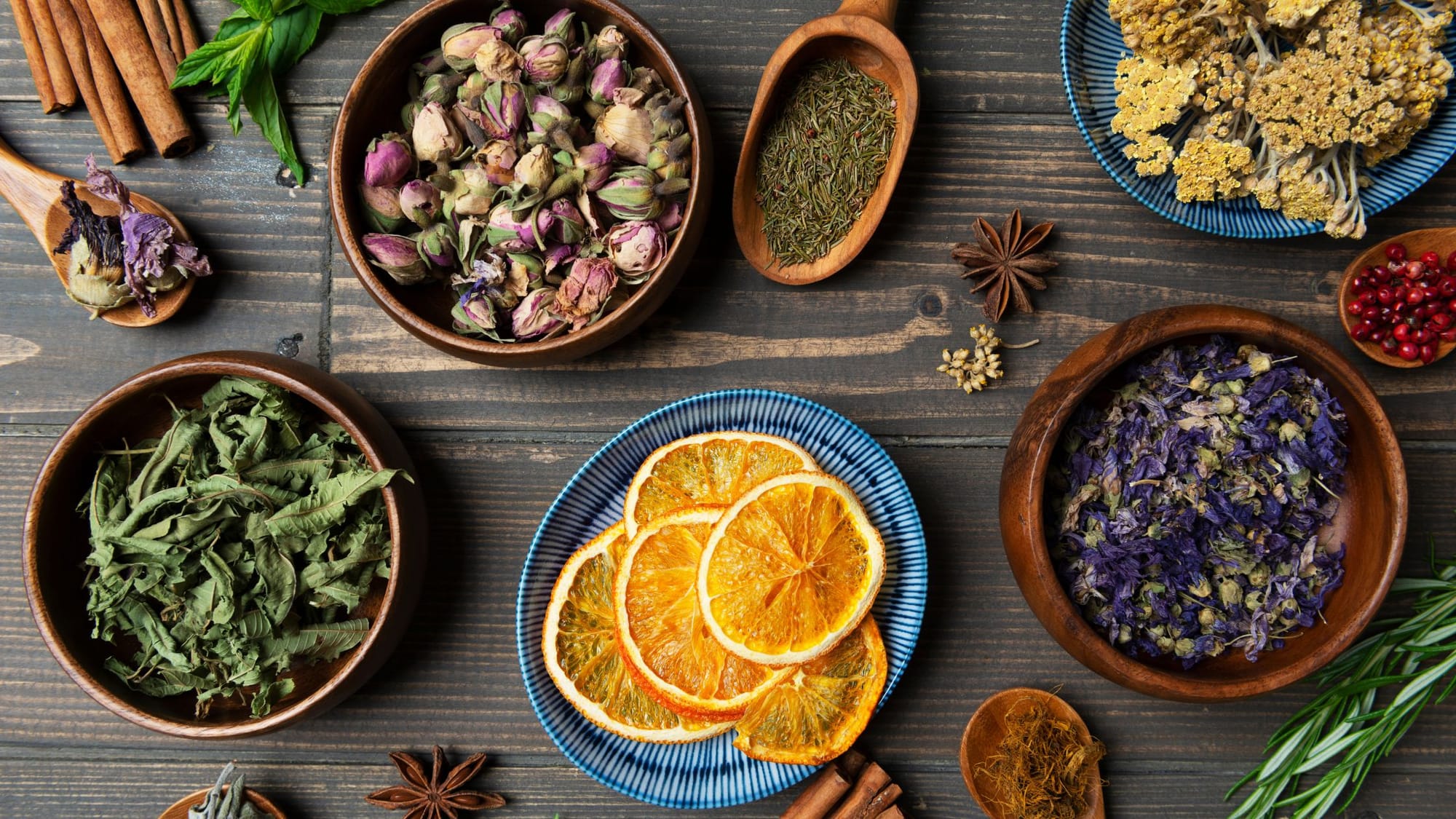
Building a Healthy Foundation
A balanced diet, regular physical activity, adequate sleep, and a healthy lifestyle form the cornerstone of good health. These elements work together to create a strong base that supports the body's natural ability to self-heal and maintain balance (homeostasis).
Nutrition's Role
Nutrients and micronutrients are vital for the body's functions. They help in everything from energy production and cell repair to strengthening the immune system and managing hormonal balance. Understanding the nutritional needs specific to your body type and health condition is crucial in holistic herbalism.
Matching Herbs with Lifestyle Choices
Holistic herbalism isn't just about taking herbs; it's about integrating these natural remedies into a broader health strategy that includes diet, exercise, and other wellness practices. For example, while an herb might help reduce stress, it works best when combined with a healthy sleep routine and proper diet.
Synergy of Practices
Herbs can enhance or complement other health practices. For instance, using anti-inflammatory herbs like turmeric in conjunction with a diet low in inflammatory foods can amplify the body's overall health and resilience. Similarly, adaptogenic herbs might be more effective when paired with mindfulness practices that reduce stress and improve mental clarity.
5. How To Start Practicing Holistic Herbalism?
- Begin with Self-Assessment: Start by understanding your own health needs and goals. What are you looking to improve or heal? Consider factors like energy levels, digestion, stress, and sleep quality.
- Learn the Basics: Get familiar with some common herbs and their uses. Focus on herbs that are known for their safety and versatility, such as chamomile for relaxation, ginger for digestion, and turmeric for inflammation.
- Integrate Gradually: Incorporate one or two herbs into your routine and observe how your body responds. This could be as simple as starting with herbal teas or adding specific herbs to your meals.
- Educate Yourself: Read books, attend workshops, and take courses on herbal medicine. Learning the basics of how herbs work in the body and how to use them safely is crucial.
- Grow Your Own Herbs: If possible, start a small herb garden. This is a great way to get to know herbs intimately. Growing your own herbs such as basil, mint, or lavender will also ensure you have fresh, organic herbs on hand.
- Practice Mindful Experimentation: As you learn about different herbs, try them out carefully and observe how your body responds. Keeping a journal can be helpful in tracking your experiences and outcomes.
6. Resources For Learning Holistic Herbalism
Books:
Start with some foundational texts like "Medical Herbalism" by David Hoffmann, "The Complete Herbs Sourcebook" by David Hoffmann, or "The Modern Herbal Dispensatory" by Thomas Easley and Steven Horne.
Online Courses:
Look for online courses from reputable sources such as the Herbal Academy or the School of Evolutionary Herbalism. These platforms offer beginner to advanced courses that are structured to help you understand holistic herbalism deeply.
Websites:
Explore websites like the Chestnut School of Herbal Medicine and the Herbal Academy's blog for free articles, videos, and tutorials that can provide further insights into holistic herbalism.
7. Final Thoughts
Holistic herbalism goes beyond just substituting herbs for medications; it focuses on the whole person—body, mind, and spirit. This approach is part of a broader health system that includes diet, lifestyle, and more, aiming for comprehensive well-being.
Become a Sista and follow us on Instagram, subscribe to our YouTube channel, and tune into our podcasts on Spotify!
Frequently Asked Questions About Holistic Herbalism
1. What is a holistic herbalist?
A holistic herbalist is someone who uses herbs to treat the entire person, considering their physical, emotional, and spiritual health, not just specific symptoms or diseases.
2. What's the difference between holistic and herbalist?
"Holistic" refers to an approach that considers the whole person or the entirety of a system. A "herbalist" is someone who studies and uses herbs for medicinal purposes. While a herbalist might use herbs to treat specific ailments, a holistic herbalist focuses on balancing the whole body and mind using herbs.
3. How long does it take to become a herbalist?
The time it takes to become a herbalist can vary widely. Some basic courses might take a few months, while more comprehensive training, including certification, can take a few years, depending on the level of expertise and specialization desired.
4. Is herbal medicine holistic?
Herbal medicine can be holistic if it's used as part of a broader approach that addresses the complete health of an individual, including physical, emotional, and spiritual aspects. However, using herbal medicine only to replace conventional drugs without this broader perspective is not considered holistic but allopathic just as regular medicine, treating symptoms and not root causes.
5. What does an herbalist actually do?
A herbalist uses plants and herbal preparations to prevent illnesses, improve health, and promote wellness, boosting the body's inner vital force and self-healing powers. They assess individual health needs, recommend specific herbs and prepare herbal formulations like teas, tinctures, or capsules. Herbalists also educate clients on lifestyle and dietary changes that complement herbal treatments.
6. Do you need a medical degree to be a herbalist?
No, you do not need a medical degree to become a herbalist. However, thorough training in herbal medicine is crucial. This can be through dedicated herbal medicine programs, workshops, or certification courses. Some herbalists may choose to pursue degrees in related fields like naturopathy or integrative medicine to enhance their practice.
